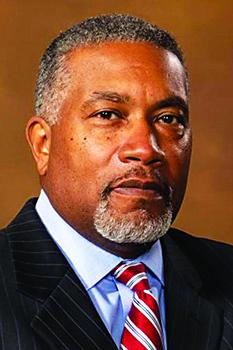
Dr. Darin J. Waters, deputy secretary for the state’s Office of Archives and History and a well-known North Carolina historian, will give the Hari Jones Memorial Lecture at 7 p.m. on Monday, June 19 at Mt. Sinai Missionary Baptist Church, located at 1217 Murchison Road.
Dr. Waters currently oversees the operations of the divisions of State History and Maritime Museums, State Historic Sites and Properties, Archives and Records, Historical Resources (including the State Historic Preservation Office, Office of Historical Research, and the Office of State Archaeology), and commissions (including Roanoke Island Festival Park and Tryon Palace), and Education and Outreach.
He is also the secretary of the North Carolina Historical Commission and the State Historic Preservation Officer.
An Asheville native, Waters was most recently an Associate Professor of History at UNC Asheville, and the Executive Director of UNCA’s Office of Community Engagement. He previously held other teaching, research, and community engagement positions at UNCA, UNC-Chapel Hill, and N.C. State University.
Waters received a B.S. in Political Science and Government from Liberty University, a master’s in History from North Carolina State University, and a Ph.D. in History from UNC-Chapel Hill. He has served on numerous nonprofit and state boards, including the North Carolina Historical Commission and African American Heritage Commission.
Within his role with the state’s history museums, Waters, along with other historians, is working on the content of the NC History Center on the Civil War, Emancipation & Reconstruction, which is being built in Fayetteville’s Arsenal Park; and will replace the current Museum of the Cape Fear.
Unlike other history museums, the facility in Fayetteville will be a “teaching” museum and not a “collecting” museum. It will use existing scholarship from universities, coupled with first-hand accounts of North
Carolina families, to examine, for the first time, what an entire state faced as the result of the Civil War. It will communicate that knowledge both in person and online so that schoolchildren — and all of us — may learn from it.
Juneteenth and the Hari Jones Memorial Lecture Series
Jones was a prominent African American historian whose area of expertise centered on the contribution of Blacks during the Civil War. He was first heard by organizers of the Center as they visited museums in
Washington, D.C. Jones became a close advisor to the Center and spoke several times in Fayetteville before
his death.
To honor his memory — and his commitment to raising awareness of the African American community’s contributions during the Civil War, Reconstruction and Jim Crow eras — the center decided to sponsor the Hari Jones Memorial Lecture Series.
NC History Center on the Civil War, Emancipation & Reconstruction
A group of local Fayetteville residents originally got the project off the ground by getting a $1 million planning grant from the N.C. General Assembly in 2007. With the funding, over the next few years, the board hired Germann & Associates, the Winslow Group and the Planning Edge, all of which have experience in museum startups, to assess existing resources, pursue community wide feedback and discussions and come up with a strategic and programming plan.
The Center project has been divided into three phases. Phase 1 includes:
- The Arsenal House, which was renovated primarily for K-12 students. It includes a classroom, a distance learning studio and a technical support room, all part of the Digital Education Outreach Center.
The Outreach Center is an online educational resource to teach the history of the period before, during and after the Civil War to public school students across North Carolina. - The Culbreth House, which was renovated for higher education purposes. It will become the Center for the Study of the Civil War and Reconstruction in North Carolina. A catering kitchen and upstairs offices were added, as was a library, which will house an extensive collection of Civil War and Reconstruction books. It will be used as the offices for the Center’s Foundation.
- The Davis House will be used to help interpret the site of the U.S. Arsenal (later a Confederate Arsenal), where it is situated.
Phase 2 consists of a new outdoor education pavilion and the construction of a boardwalk that will run parallel to the remains of the Arsenal. Construction of Phase 2 is scheduled to begin soon.
Phase 3, the groundbreaking of which was held last summer, is a 55,000-57,000 square-foot main building that will replace the existing Museum of the Cape Fear, which was built on the site where the U.S. Arsenal once stood in Fayetteville.
The Center, once complete, will be owned and operated by the N.C. Department of Natural and Cultural Resources. The building is currently being designed, with construction to begin soon. The latest estimates are that the building will be completed in the first quarter of 2027 — with the online portion of history instruction for teachers and students to be rolled out before then.
The history of all of North Carolina with an evenhanded approach
The Center is taking an evenhanded approach to North Carolinians’ Civil War experiences, precisely because no one agreed on it then — and no one agrees on it today.
As author Philip Gerard has pointed out, the documented history of the Civil War in the state showed that North Carolina’s white population was almost evenly split between Confederates and Unionists. More than 300,000 people — fully a third of North Carolina’s population — had no say on it at all, because they were enslaved.
Those involved in the planning of the center plan to use the existing Fayetteville Arsenal, destroyed during the closing days of the Civil War by Union Gen. William Tecumseh Sherman, as a jumping-off point to focus on the experience of an entire state.
The Center will gather both documented and oral histories of people, places and events that are either passed down or found through scholarly research, to tell the stories of what North Carolina families’ lives were like before, during and after the Civil War. Stories are still being sought from women, children, the elderly, farmers and businessmen, American Indians, African Americans, immigrants and persons of all faiths.
The Center will also gather peer-reviewed research from history professors within the University of North Carolina system, which will be used to write a Civil War history curriculum in partnership with the NC Department of Public Instruction, for use by schoolchildren. In North Carolina, the Civil War is taught in public schools to fourth and eighth grade students and included in U.S. history courses in the eleventh grade.
Students and teachers from Manteo to Murphy will be able to access course materials online. Research shows that once completed, the Center will contribute 200 new jobs and $18 million in economic benefit to Fayetteville every year.
For more information, please visit http://nccivilwarcenter.org/. On the website, visitors may make donations or leave your own story of how your family fared in North Carolina during the time before, during and after the Civil War.

 How to resolve AdBlock issue?
How to resolve AdBlock issue? 








